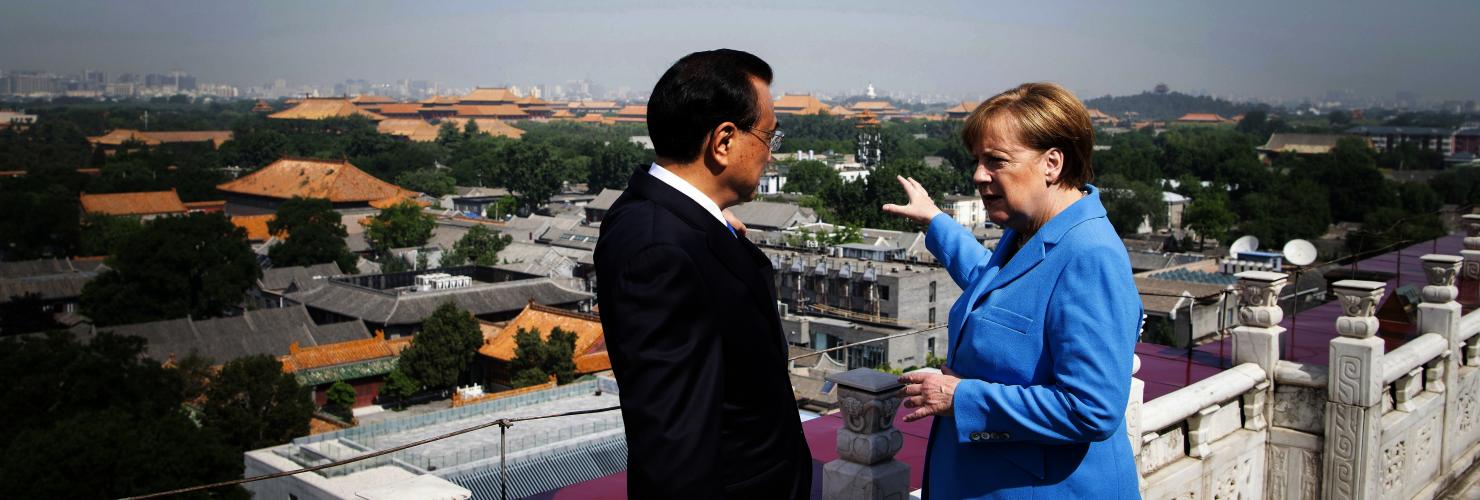

Merkel’s China challenge – signaling distance and conditional engagement
The German Chancellor’s visit must signal Beijing that Europe is serious and united in its newly critical approach to China and show Washington that there are less destructive ways to deal with differences, says Mikko Huotari.
With the US and China locked in a destructive spiral of muscle-flexing over trade and technology, German Chancellor Angela Merkel’s visit to China, which starts today, will be a litmus test for whether the European Union stands any hope of tackling the West’s differences with China in a more goals-oriented way.
Any sign during Ms Merkel’s two-day trip that Beijing can be better persuaded than bullied into dealing with its lack of economic reciprocity and discrimination of foreign companies would be good for the EU and the world economy. One win would be movement in the tough talks about an EU-China investment agreement, which Merkel would like to have signed next year when Germany hosts a summit between all 27 EU member states and China.
Europe’s weakness demands a smarter play
Since announcing she would not run again for Chancellor, Ms Merkel has variously been suspected of having lost her touch or even of being a lame-duck head of government. But the complexities and dangers the EU faces in triangulating the positions of the US and China demand the kind of canny operator Ms Merkel has often proved herself to be – one that can engage one side without prompting the other to dis-engage, and vice versa.
The EU and the US might be at odds over how to deal with China’s economic and other policies, but not over the need to get Beijing to change them. This spring, the EU Commission used its new strategic outlook for EU-China relations to describe Beijing as a strategic competitor and systemic rival for the first time. In this spirit, the French government is pushing the EU to set conditions for Chinese companies bidding for public contracts, a demand Berlin might yet support, if only to create leverage in ongoing EU-China negotiations.
But the EU is no geopolitical superpower like the US. No European leader would risk the kind of confrontation Washington is seeking with Beijing – and Germany would not want to fully back Washington for the reasonable fear of being isolated in the event of an about-face by the Trump administration. Merkel knows Europe’s weakness demands a smarter play.
Open and clear communication with China is needed
Playing it smart can’t mean business-as-usual for Merkel – even with a massive German business delegation accompanying her to China. The Hong Kong protests and Beijing’s strong-arming of multinational companies bring into focus the myriad ways in which Beijing exerts pressure on its citizens and businesses. The increasing systemic tensions between China and liberal democracies demand that Merkel reinforce Europe’s coordinated stance that Beijing’s approach to Hong Kong’s fundamental freedoms and autonomy is a test case for the EU’s willingness to treat China as a partner.
Berlin has been central to shaping the EU’s new, less naïve China policy – and Ms Merkel needs to show that even economic expediency will not see Germany backsliding. For now, Merkel’s government is pursuing a wobbly policy on the role of Huawei in the 5G telecoms rollout and shying away from the clear political decision that would be necessary to align European forces. Berlin kicking the can down the road on 5G threatens Europe’s late awakening to the importance of technological sovereignty and consensus-building on infrastructure security.
The ongoing European debate about how to better deal with China’s state-led economy and unfair competition needs to be underpinned by concrete and speedy steps by the EU at home – together with loud and clear demands for equal treatment of state and private (foreign) firms or “competitive neutrality” in China. Merkel needs to counter vague rhetorical commitments by China’s leaders to multilateralism with specific requests to reform the World Trade Organization to tackle distortions caused by China’s industrial subsidies.
Engagement is possible - if it aligns with European interests
Constructively delineating the differences between the EU and China should serve Merkel as a foundation to pursue clear-eyed engagement in a few, well-defined areas if they are aligned with long-term pan-European interests. With the backing of of EU member states, these might include research and innovation cooperation in smart manufacturing, standard-setting for the industrial internet and autonomous driving, and what could be called a strategic sustainability agenda focusing on climate and environmental technologies.
It’s time for Germany to match its rhetoric about the need to “Europeanize” approaches to China with concrete actions. The EU’s ambition of forging a forceful, coordinated and competitive China policy can only be fulfilled if Berlin demonstrates its willingness to act as its guarantor while continuing to test China-policy alignment with more reliable partners in the US. Moderate disengagement from China also needs to be among the cards for European governments to play. A realist, nuanced and incremental European approach to China would then have the chance of proving itself a credible alternative to Donald Trump’s gunboat economic diplomacy.
This article was first published by the EUobserver on September 5, 2019.

